
The Mediterranean Diet: Your Heart’s Best Friend?
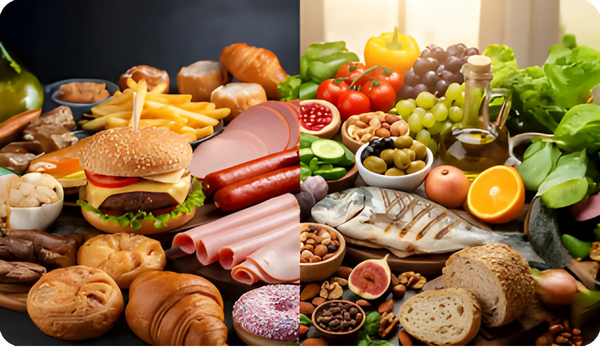
Cholesterol doesn’t just appear overnight.
It builds up over years of diet and daily habits - adding pressure to your heart over time.
While some cholesterol is essential, too much “bad” cholesterol can slowly build up in your arteries over time.
♥️ HDL (“good”) cholesterol – helps remove excess cholesterol from the blood, protecting arteries and supporting heart health.
❌ LDL (“bad”) cholesterol – can deposit in artery walls over time, leading to plaque buildup and increasing heart risk.
Experts agree that what we eat, how active we are, and other everyday choices all play a role in keeping these levels balanced.
But there’s one approach that takes people by surprise:
The Mediterranean diet.
It’s the tastiest way to support your heart — full of colourful, fresh foods, fragrant herbs, and golden olive oil. Best of all, it’s simple enough to start enjoying today.
Why the Mediterranean Diet Works
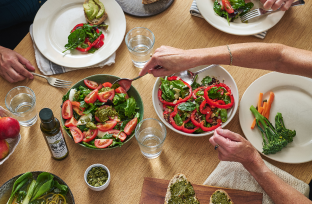
The Mediterranean diet isn’t about strict rules or bland meals. It’s about eating delicious, indulgent dishes that nourish your heart and help to balance cholesterol.
People in Mediterranean countries consistently have lower rates of heart disease, and experts attribute this to the foods they enjoy every day:

Plenty of vegetables, fruits, legumes, and whole grains

Nuts, seeds, and healthy oils such as olive oil

Regular seafood and lean meats in moderation

Limited saturated fats, processed foods, and red meats
This pattern is not only associated with heart health but also with long-term energy and even a longer life.
Recommended Food Swaps

Eat Less Of These:

Eat More Of These:
Margarine
White bread, pasta, rice
Wholegrain breads, brown pasta, brown rice
Cornflakes
Sweet biscuits, cakes, chocolate, crisps
Oatcakes, digestives, nuts, dried or fresh fruit
Lentils, beans, peas
Sausages, burgers, fatty meats
Lean meat, seafood, oily fish
The Benefits Of Olive Oil

Olive oil is the cornerstone of the Mediterranean diet.
Beyond its rich, fruity flavor, it’s packed with monounsaturated fats and polyphenols, plant compounds shown to support heart health and help maintain healthy cholesterol levels.

Monounsaturated fats: linked to lower LDL (“bad”) cholesterol and higher HDL (“good”) cholesterol.

Polyphenols: plant compounds with antioxidant properties that may help reduce inflammation and protect arteries.
Swapping butter or margarine for olive oil is one of the simplest, tastiest ways to make your meals heart-friendly.
Try:
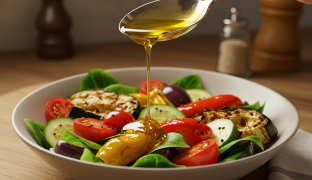
Drizzling over salads and roasted vegetables
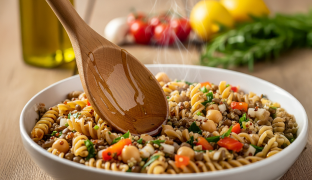
Stirring into pasta, grains, or legumes
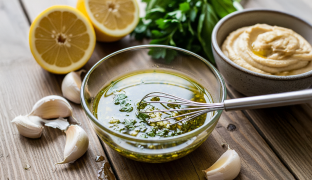
Using in homemade dressings and dips
High-Polyphenol Olive Oils
Experts agree that not all olive oils are created equal.
In fact, 80% sold in supermarkets are proven to be fakes - and mixed with cheaper, unhealthy oils.
Doctors advise choosing a pure, high-polyphenol olive oil for the healthiest heart benefits.

For example, Dr Sarah Brewer - a Cambridge-trained GP and author of over 70 health and nutrition books - endorses Ancient Roots Olive Oil.
She recommends Ancient Roots because it comes from volcanic soils in Tuscany, giving it much higher levels of polyphenols and a richer taste.

Grown in volcanic soils in Tuscany, naturally increasing polyphenol content

Rich, aromatic flavour that enhances any dish

Recommended by Dr Sarah Brewer, a GP and nutrition author
Simple Mediterranean Tips For A Healthier Heart


Aim for five portions of fruit and vegetables daily, fresh, frozen, or canned.

Base meals on wholegrains like brown rice, pasta, bread, or oats.

Include fish regularly, with oily fish providing essential omega-3 fats.

Snack on nuts and fruit instead of pastries or crisps.

Prep meals with olive oil wherever possible!
For more information on how olive oil can help you reach your health goals, Dr Sarah Brewer's free video presentation explains everything. Tap below to find out:
How Mediterranean people have such fantastic health
The problem with most olive oils in supermarkets
The Italian 'olive oil secret' which supports a healthier heart - and a long, youthful life!

Watch This Free Video

Backed by science. Recommended by Dr. Sarah Brewer.
